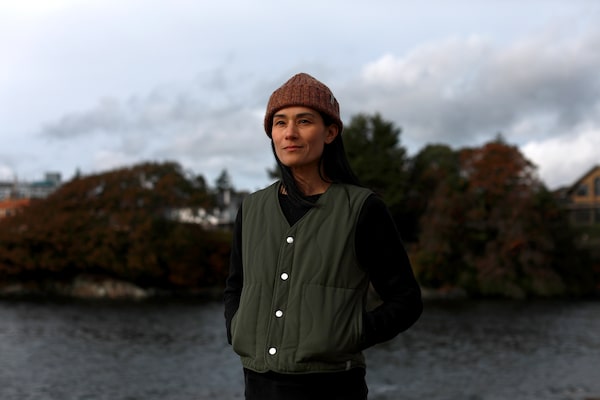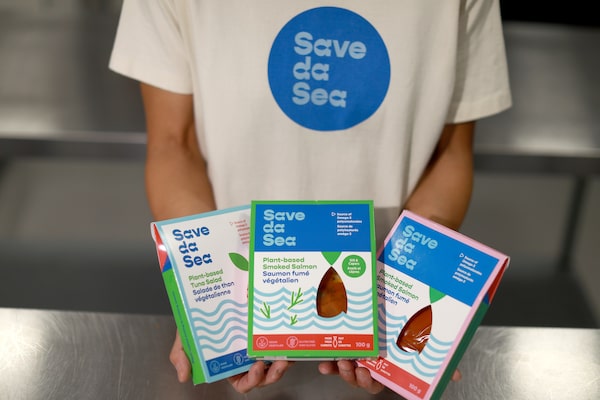
Aki Kaltenbach, founder and CEO of Save da Sea Foods Inc. in Victoria, on Oct. 31.CHAD HIPOLITO
Developing a new consumer product and exporting it into a growing market is an exciting prospect for any entrepreneur. But for Aki Kaltenbach, founder and chief executive officer of Save da Sea Foods in Victoria, moving quickly into the United States with her plant-based seafoods also comes with challenges.
“It’s a bit of a land grab, and we want to take advantage of our first-mover advantage there,” says Ms. Kaltenbach, who got the idea for her vegan offerings four years ago when she was general manager of the three Japanese restaurants that her family owns in Whistler, B.C. Newly vegan at the time, she noticed that while plant-based meats were gaining prominence, there were few alternatives to seafood.
She created menu items made from sustainable ingredients and in 2019 started Save da Sea, with the intention of marketing the products to the food-service industry. When the COVID-19 pandemic hit restaurants in early 2020, she shifted to the consumer product goods (CPG) market, and today the company’s products are in the refrigerated sections of 500 stores across Canada, from natural-foods retailers to grocery chains.
The products are made from minimally processed whole foods meant to convincingly mimic the taste and texture of seafood. There is smoked salmon based on carrots, with a second variation that includes dill and capers, and tuna salad made from jackfruit, vegan mayonnaise, lemon and pepper.
Finding customers south of the border is a natural next step, Ms. Kaltenbach says. While the company’s revenues in Canada are tripling year over year, it’s a small market and the vast distances present hurdles, given that the fresh products have a shelf-life of just 70 days. She sees the U.S. as a “white-market space” she’d like to take advantage of.

The products are made from minimally processed whole foods meant to convincingly mimic the taste and texture of seafood.CHAD HIPOLITO
Her strategy is to first concentrate on the neighbouring Pacific Northwest region, starting with natural-foods retailers. It’s an arduous process; for example, Whole Foods does category reviews for new products just once a year and it’s another nine months before the items get to shelves.
As she looks to a U.S. launch next spring, Ms. Kaltenbach has lined up experts to help her navigate such processes. She raised some seed funding and, at a pitch event in early 2021, was paired with a U.S. mentor named Eric Schnell, a CPG veteran who co-founded the world’s first plant-based seafood company, Good Catch.
“That’s like a needle in a haystack,” says Ms. Kaltenbach, who hired Mr. Schnell and his team at BeyondBrands, a strategic consulting agency for natural products in New York City. They walked her through the different players in the industry, advised on how the company should price its products and introduced her to a broker called Ying Yang Naturals to link Save da Sea to retailers and present its product to them. “They act as the gatekeepers in a lot of ways,” she explains.
Mr. Schnell, founder and CEO of BeyondBrands as well as a serial entrepreneur, says it’s critical for companies to have brokers to launch in the CPG space.
“They are your feet on the street, the sales force that is out there knocking on doors, speaking to buyers, presenting the brand, managing distributors,” he says.
Most small CPG firms don’t have the resources to build their business in another country, Mr. Schnell notes. A consultancy like his offers fractional sales and marketing management, “meaning that you’re paying a fraction of what you’d pay to have a full-time employee in the country,” and a master distributor can be lined up to be the importer of record.
He advises Canadian companies looking to export to “focus on your backyard, own your country, maximize your brand, learn all your mistakes, raise your capital and understand your core consumer” before making the leap.
“There’s no rush to go to another country unless you’re really prepared. Rushing causes mistakes, and those mistakes are always super costly,” he says.
Ms. Kaltenbach says that for small businesses like hers, “advisers in whatever capacity are hugely helpful.” For instance, Save da Sea has hired a firm to help it design its U.S. packaging.
The company has been assisted by the Canadian Trade Commissioner Service (TCS) and Trade and Invest BC, which invited Save da Sea and other emerging brands to exhibit their products last March at the Natural Products Expo West, the world’s largest business-to-business trade show for natural products, held in Anaheim, California.
The TCS has given the company a CanExport grant to help it expand into the new market, which will pay half of the cost of designing and printing new packaging, trade-show registrations and visits by Ms. Kaltenbach to major retailers. The TCS has also asked the company to participate in the Canadian Taste Makers Virtual Accelerator Program, which helps innovative Canadian brands launch in the U.S.
Today Save da Sea has four full-time and two part-time employees, and its products are co-manufactured in Vancouver. If it moves to other export markets such as Japan – Ms. Kaltenbach is half Japanese and she’s had inquiries for her plant-based seafood products from there – it could be made in such offshore locations.
The current environment of rising inflation is a concern for a company making products that are “definitely on the higher end,” she says. But her vegan smoked salmon is on par, price-wise, with the real thing and intended for special occasions, while the tuna salad is “more recession-proof because it’s more of an everyday item.”
Ms. Kaltenbach is also on a mission to tell people about the wider benefits of finding alternatives to seafood. She points out there are health concerns about mercury, toxins and plastics found in seafood and that scientists are predicting the world’s oceans could collapse by 2048.
“The way we consume seafood right now is not sustainable,” she adds.